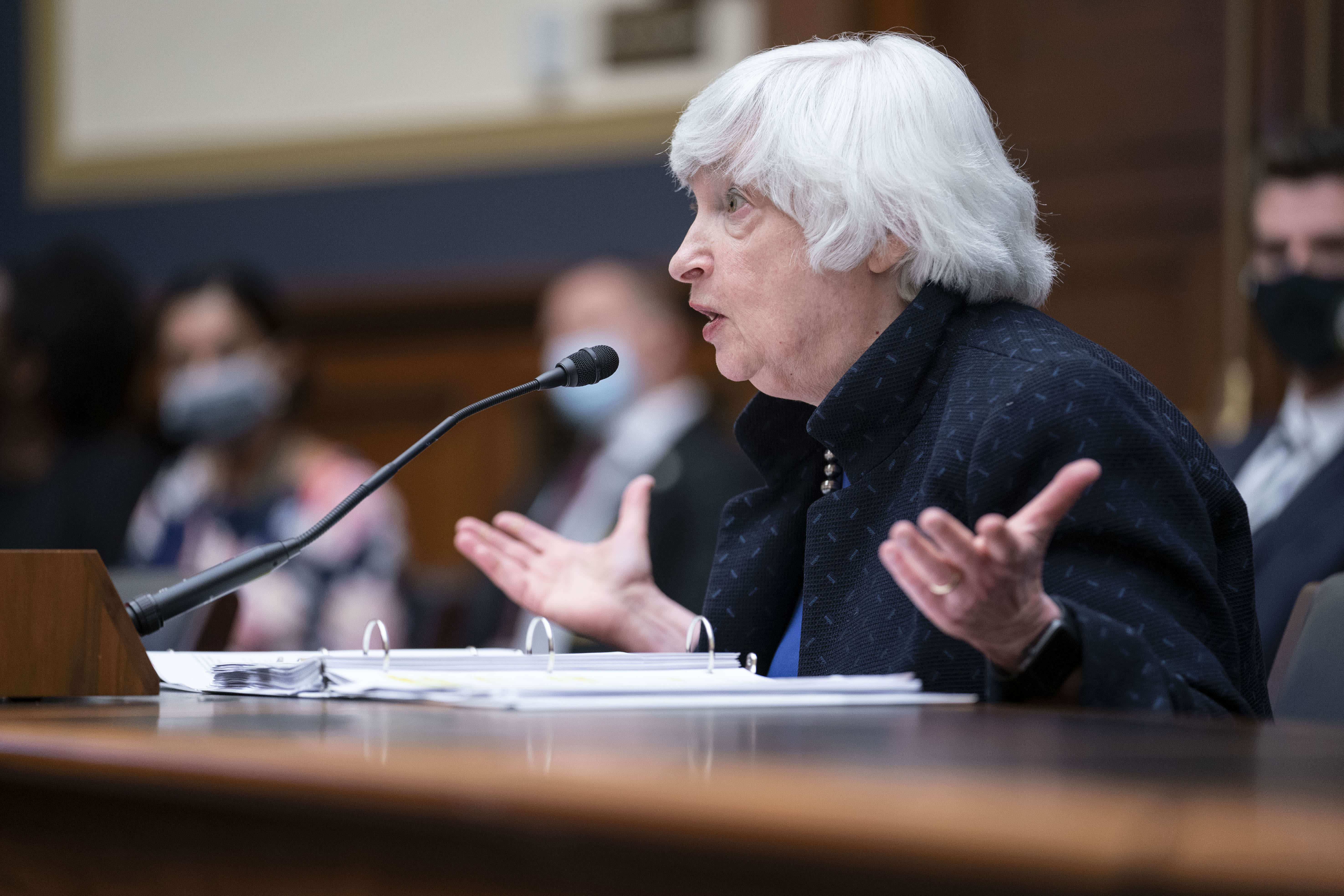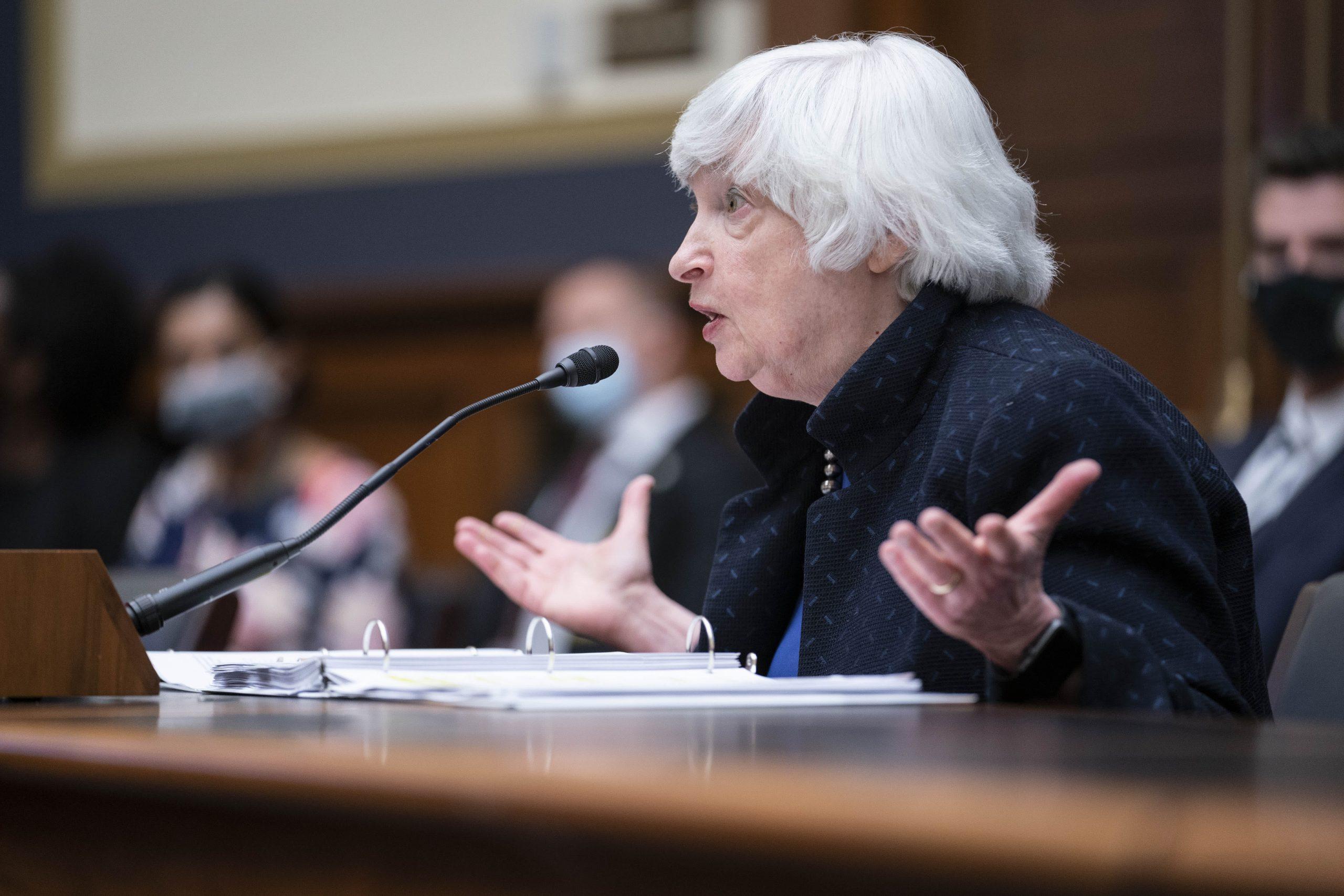
Treasury Secretary Janet Yellen on Tuesday said she believes the economy would fall into a recession if Congress fails to address the federal government’s borrowing limit before an unprecedented default on the U.S. debt.
“I do regard Oct. 18 as a deadline. It would be catastrophic to not pay the government’s bills, for us to be in a position where we lacked the resources to pay the government’s bills,” Yellen said during an interview on CNBC’s “Squawk Box.”
President Joe Biden on Monday called on Congress to raise the debt limit this week and avoid even approaching near-certain economic turmoil. He blamed Republicans and Senate Minority Leader Mitch McConnell, R-Ky., for standing in the way of legislation that would lift the borrowing cap through a filibuster.
“I fully expect it would cause a recession as well,” Yellen added Tuesday.
The Treasury secretary has for weeks warned House Speaker Nancy Pelosi, D-Calif., and Senate Majority Leader Chuck Schumer, D-N.Y., that the U.S. will no longer be able to honor its debts around Oct. 18. Lawmakers must raise or suspend the debt ceiling before that date or risk the first-ever U.S. default.
The Treasury Department is currently using so-called emergency extraordinary measures to pay down U.S. receipts since reaching the last debt ceiling at the end of July. Extraordinary measures allow the department to both conserve cash and draw down certain accounts without issuing new bonds.
But those measures are temporary and are only forecast to endure until mid-October, according to Treasury estimates.
While the U.S. has never failed to pay its bills, economists say a default would spark widespread damage through a jump in interest rates, tarnished faith in Washington’s ability to honor its future obligations on time and potentially delaying Social Security checks to some 50 million older adults.
Members of the U.S. armed services could also see their pay delayed as a result of a default.
Inaction could also tempt some countries to hold fewer Treasury bonds and weaken demand for the dollar, possibly giving China an upper hand in its bid to replace the greenback as the globe’s preferred currency.
“U.S. Treasury securities have long been viewed as the safest asset on the planet,” Yellen said. “That partly accounts for the reserve status of the dollar. And placing that in question by failing to pay any of our bills that come due would really be a catastrophic outcome.”
Lawmakers on both sides of the political aisle recognize that the debt ceiling must be increased or risk economic upheaval. But the two sides appeared far from a compromise as of Tuesday morning.
Where Republicans and Democrats disagree is on how to lift the borrowing cap, with each using the issue as a political bludgeon.
Republicans, who are fed up by what they view as Democrats’ excessive spending plans, say Biden, Pelosi and Schumer should single-handedly fix the problem by putting a suspension in their multitrillion-dollar social policy and climate reconciliation bill.
Reconciliation allows a party to pass certain bills with a simple majority in the Senate versus the usual 60-vote requirement, making it immune to the GOP filibuster. McConnell has made it clear no member of his caucus will support efforts to raise the ceiling ahead of the 2022 midterm elections.
“Since mid-July, Republicans have clearly stated that Democrats will need to raise the debt limit on their own,” McConnell wrote to Biden on Monday. “Bipartisanship is not a light switch that Speaker Pelosi and Leader Schumer may flip on to borrow money and flip off to spend it.”
“For two and a half months, we have simply warned that since your party wishes to govern alone, it must handle the debt limit alone as well,” he added, in reference to the reconciliation effort.
If Republicans stand by their threat, Democrats may ultimately be forced to include a ceiling suspension in their reconciliation bill.
That would be a tall order since many in the party say the massive piece of legislation is still weeks from being ready and amid efforts to cut back the plan to appease moderates Sens. Joe Manchin, D-W.Va., and Kyrsten Sinema, D-Ariz.
Undermining that argument is the fact that Democrats could also opt to pass a standalone piece of legislation to raise the borrowing limit with a separate reconciliation bill. That route would not require any Republican votes and allow moderate and progressive Democrats to work on their safety net package on the side.
Democrats may not like that option since addressing the ceiling via reconciliation would force the party to raise the limit instead of merely suspending it. Suspensions allow the government to float new debt for a certain period of time instead of capping it at a certain dollar figure.
After suspensions expire, the new ceiling sets at whatever level the outstanding debt has grown to by that date.
Sen. Pat Toomey, R-Pa., wrote on Twitter Tuesday that he believes Democrats are worried about being linked to a debt limit figure around or above $30 trillion.
Linking the Democrats to such a massive figure — while the product of spending and tax cuts approved by both parties — would make for bad optics for the party during the 2022 midterm elections.


 Signal2forex.com - Best Forex robots and signals
Signal2forex.com - Best Forex robots and signals




